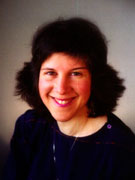| | Homeopathy: Preventing Breast Cancer | |
You might be asking yourself, "So, why is she telling me all of these gory details? Is she trying to scare me?" The answer is an emphatic "no"! My hope in writing this article is to stimulate you to pay more attention to your breasts and to lead a lifestyle which is likely to result in your never getting breast cancer.
So, what can I do to lower my risk of getting breast cancer?
- Don't obsess about breast cancer! If you follow these guidelines, you are doing all that you can to minimize your risk. Use the statistics as reminders to take care of your body, but don't get hung up on them. Your destiny is largely up to you. The more you feed a fear, the more likely it is to manifest.
- Keep your breasts happy and healthy. Love them and yourself. We often develop illnesses because of our own unresolved feelings and lack of love for ourselves. Our breasts are beautiful, no matter what their size or shape. Breasts and wombs are the primordial symbols of womanhood, not just motherhood. Appreciate your breasts as a bountiful source of your love and creative energy. Deal with any unresolved maternal, nurturing, and relationship issues so they're not lurking in your breasts.
- Check your own breasts regularly. Do monthly self-breast examinations after your period is over. If you find any lumps or tenderness that concerns you, have it checked out right away, before your fear or denial mechanisms get going. If you have fears about examining or touching your breasts, get some help to overcome those fears. More than one of the articles I read about breast cancer warned against relying on self- breast exams to discover breast cancer. I agree that women shouldn't rely totally on self-exams, however self-breast exams allow you to get to know your body better, help you to feel more in control of your body, and will sometimes result in your finding a breast lump which has not been diagnosed. Fortunately, 80% of breast lumps are benign. When you examine your breasts, remember that lumps which are soft, movable, and change with your menstrual cycle are much less likely to be cancerous. Any discharge from the nipple other than breast milk should be checked out by your health professional.
- Have your breasts examined by a professional. Go get a breast exam from an experienced women's health care practitioner once a year, at the same time you get your Pap smear. She (or he) will have felt a lot of breasts and will be able to offer you reassurance as well as catching any problems.
- Get regular mammograms. Most of us, myself included, are suspicious of radiation of any kind. With good reason. There are definitely some sources of radiation that actually increase the risk of cancers. From all that I have read, however, it seems that mammograms are free of danger and greatly increase the odds of discovering breast cancer earler than you would by just examining your breast. I had my first mammogram last year, after seeing two patients in my office with metastatic breast cancer. It only hurt a little, when they pressed my breasts down on the radiographic plate, and I, like most women, was relieved to have a normal mammogram. I f I feel any suspicious abnormalities in my patients' breasts, I do recom- mend a mammogram. I n a woman without breast symptoms and with no significant risk of breast cancer, I recommend mammogams beginning age 35 or 40 every two years (or yearly, if she prefers). For women without breast symptoms who are at higher risk of breast cancer, I recommend yearly mammograms beginning at age 35. Beginning at age 50, the rate of breast cancer goes up, so yearly mammograms are a good idea. My motto about mammograms, trite though it may sound, is "Better safe than sorry."
- Reduce your dietary fat. Whether or not it is confirmed by all the scientific studies, there is clearly enough information to suggest that the more fat you eat, the higher your risk of breast cancer. And since a high fat diet also predisposes to heart disease, obesity, gall bladder disease, osteopoosis, and a myriad of other problems, you can't lose by cutting down on rich foods. The absolute best way to decrease fat intake is to become a vegan (no meat, chicken, fish, or dairy). Next best is to be an ovo-lacto vegetarian. Next to only include fish, etc. The worst sources of fat are red meat and deep-fried foods, but fats are often hidden. If you do eat dairy, choose low-fat milk, cheese, and yogurt. It's best to begin to reduce fat as early as possible after puberty, before poor eating habits and excessive weight set in.
- Think twice (or more) about taking hormones of any kind. There are natural alternatives for birth control, menstrual problems, and menopause. Consider them carefully before taking hormones.
- If you can, have your babies earlier rather than later. Not every woman has her babies according to schedule, but having your first child before age 30 will reduce your risk of breast cancer.
- Limit alcohol intake. Don't drink more than one glass of alcohol a couple times a week.
- Cut out caffeine. Caffeine, in addition to jangling your nervous system, causes breast cysts in many women. Even though there's no direct correlation with breast cancer, why take a chance?
CONTINUED Previous 1 2 3 Next
 | Judyth Reichenberg-Ullman, ND, DHANP, MSW is a licensed naturopathic physician board certified in homeopathic medicine. She graduated with a degree in ...more |
|
|
Popular Related Articles/Areas
Popular & Related Products
Popular & Featured Events
Dimensions of Wellness
|
|